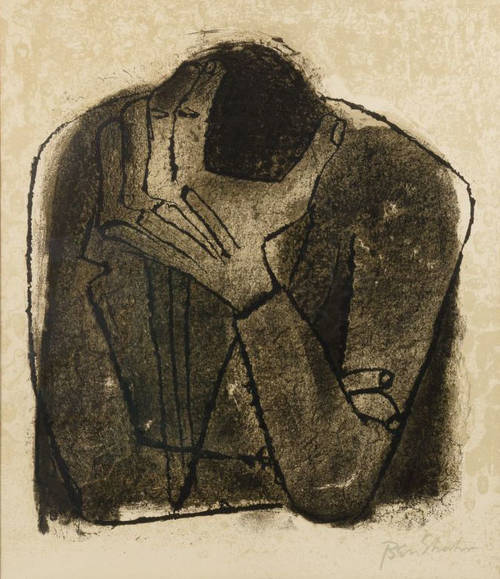Torah On the Grow, a periodic blog by Rav Shai Cherry
01/31/2020 12:00:46 PM
Not everyone has the luxury, or patience, to learn Torah every week. Torah on the Grow is for that audience. The goal is to bring a Jewish perspective to topics that surround us in our non-Jewish environment. The hope is to grow in our Jewish knowledge, in our appreciation of Jewish wisdom, and in our desire to learn more. – Rav Shai Cherry
To receive the periodic posts in your mailbox, click here to subscribe.
A Shanda fur die Goyim: Another Argument for Conservative Judaism
08/28/2020 01:49:26 PM
Like many of you, I was sickened by the article that appeared on the front page of Sunday’s Inquirer. Whenever the first word of a headline is “Jewish,” I get nervous. In this case, Jews were both victims and perpetrators. Last year, a local Jewish family suffered a very late and unexpected miscarriage. Through one of our local Jewish funeral homes, the parents arranged to have their stillborn son, Noach, buried in Lakewood, NJ.
Once Julia and Eugene Gross were strong enough to visit their son’s grave, they were unable to locate the section of the cemetery dedicated to stillborn children. After hiring an attorney, they discovered that their child’s body had been buried in an unmarked, mass grave. Subsequently, the Grosses received a letter from Rabbi Shmuel Tendler, the rabbi of the congregation that runs the cemetery, assuring them that Noach was “buried in accordance with the strictest standards of Jewish Orthodox Halacha and tradition.” Tendler was almost right — and that’s yet another tragedy in this story.
Rabbi Stephanie Dickstein, whose ordination Rabbi Tendler would never recognize based exclusively on her gender, explained in her 1996 legal responsum on this issue that the laws in question were originally intended to show compassion.
Scholars speculate that infant mortality rates in 1st-century Israel were roughly 30%. The rabbis were concerned about overburdening the parents and the community members with all the rituals surrounding death and mourning, so they conditioned those rituals on the baby living past its first thirty days. Should a fetus or infant not survive that long, the parents and community were exempt from nearly all associated rituals.
Today, in the US, the mortality rate is just over one half of one percent. Particularly in the highly educated Jewish community, women are having children relatively late in life. When pregnancies fail, to ignore the pain and suffering of a woman, her partner, and family is callous. By committing oneself to the form of the law rather than the goal of the law, Rabbi Tendler and his ilk have turned the halakhah from agents of mercy to agents of cruelty. Rabbi Dickstein, writing for the Conservative movement’s Committee on Jewish Law and Standards, demonstrated the compassion and courage to change the form of the law to align with the purpose of the halakhic system. (Read Rabbi Dickstein’s teshuvah here.)
Moses Maimonides, RaMBaM, would censure Tendler on two accounts. The first is his inability to understand that a law should not be adhered to when its adherence would contradict the goal. Here’s a snapshot of his philosophy of halakhah concerning pikuach nefesh (safeguarding a life):
“The laws of Torah were given to bring compassion, lovingkindness, and peace into the world. The heretics who say that violating Shabbat is forbidden [even for one who is dangerously ill] offer an example of what Ezekiel wrote citing God’s words, ‘I also gave them laws that were not good and statutes that they could not live by (Ezekiel 20:28)” (Mishneh Torah, h. Shabbat 2:3).
Ezekiel’s God gave the Israelites bad laws; RaMBaM’s God gave the Israelites good laws that, under certain circumstances, turn cold.
The second reason why RaMBaM would sanction, or even excommunicate, Tendler was that his actions constitute a chillul haShem, a public desecration of God’s name. Anyone whose stomach churned when they read The Inquirer article felt that chillul haShem in their kishkes. RaMBaM writes in his halakhic code that something done by a person of great Torah learning which causes people to speak disparagingly about him, even if he doesn’t specifically violate a commandment, commits a chillul haShem. The Yiddish rendition of that sentiment is: A Shanda fur die Goyim.
May we have compassion for the Gross family, clarity about Tendler’s desecration of God’s name, and courage to ensure that all of our tradition radiates compassion, lovingkindness, and peace.
Your Choice
03/27/2020 09:39:27 AM
Now choose life, so that you and your children may live and that you may love the Lord your God, listen to his voice, and hold fast to him. Dt. 30:19-20
Some of our political leaders are trying to balance the health of our economy against the health of our citizenry. It reminds me of this piece of Talmud:
וְאָ֣הַבְתָּ֔ אֵ֖ת יְהוָ֣ה אֱלֹהֶ֑יךָ בְּכָל־לְבָבְךָ֥ וּבְכָל־נַפְשְׁךָ֖ וּבְכָל־מְאֹדֶֽךָ׃
(A standard translation is: You shall love the Lord, your God, with all your soul, and with all your heart, and with all your might. Dt. 6:5)
 Rabbi Eliezer says:
Rabbi Eliezer says:
If the verse says "with all your soul," why does it need to say "with all your might"? And since it says, "with all your might," why does it need to say "with all your soul"?
Ahhh. If one's body is more precious to him than his money, the verse says, "with all your soul." But if one's money is more precious to him than his property, it says, "with all your might." --b. Brachot 61b
Two things to know:
1) Rabbi Eliezer was rich, and 2) the earliest interpretations of "might" from this biblical verse are property and money.
Samson Raphael Hirsch, the father of Modern Orthodoxy in Germany in the mid-19th century, turned the verse around. Whatever you love with all your heart, with all your soul, and with all your money — that is your God.
The Talmud's word for money is mammon — and that reminds of a Jewish verse from a text that became Christian, The Gospel of Matthew. "No man can serve two masters: for either he will hate the one, and love the other; or else he will hold to the one, and despise the other. Ye cannot serve God and mammon" (6:24).
As Bob Dylan said, "You're gonna have to serve somebody."
Kind, Not Degree
03/19/2020 06:27:59 PM
The Rabbinical Assembly, on March 17, posted a response to Covid-19 as it relates to remote or virtual minyans.
https://www.rabbinicalassembly.org/story/cjls-guidance-remote-minyanim-time-covid-19
The Rabbinical Assembly is the union for Conservative rabbis and houses the legal committee (Committee for Jewish Law and Standards) that discusses and advises rabbis on novel legal questions. Their decision was to endorse weekday minyans through Zoom or similar platforms because of sha'at hadehak which they translated as a crisis situation. It's a relatively short analysis that gives you a wonderful window into the halakhic process when rabbis are hunting for precedents that will justify a lenient decision. In my opinion, it's the wrong approach in this situation.
 Our rabbis, and our movement, do an admirable job of incremental change, what we might call changes in degree. A sha'at hadehak, however, demands changes in kind, not degree. To survive crises, you don't adjust positions, you shift paradigms. The question they should have asked is: what constitutes a minyan? Instead, they basically asked if a virtual platform is kosher for kaddish. That's a bottom line/tachlis question. In a sha'at hadehak, more radical questions must be asked.
Our rabbis, and our movement, do an admirable job of incremental change, what we might call changes in degree. A sha'at hadehak, however, demands changes in kind, not degree. To survive crises, you don't adjust positions, you shift paradigms. The question they should have asked is: what constitutes a minyan? Instead, they basically asked if a virtual platform is kosher for kaddish. That's a bottom line/tachlis question. In a sha'at hadehak, more radical questions must be asked.
In the Talmud's discussion of how we know that a minyan consists of ten people, the verse that is ultimately settled upon labels the ten spies sent to reconnoiter the Land of Israel as an edah, a congregation (Numbers 14:27 and b. Megillah 23b). Since that's the source that illustrates a minyan, physical proximity with visual contact can't be essential. There must have been times during their forty-day assignment when they were dispersed. Their edah was composed of a group on a mission to fulfill a specific function. Prayer services and Shabbat services using a virtual platform similarly comprise a group on a mission to fulfill specific functions. Thus, during this sha'at hadehak, ten people sharing a virtual platform constitute a minyan without qualification. (The Rabbinical Assembly's permission was qualified.)
Since gathering physically is potentially dangerous, we need to shift paradigms. This is not a question of decreasing the number of transgressions one is forced to commit when in situation of pikuach nefesh, a life-or-death situation for an individual. We are in sha'at hadehak, a time of communal crisis. The normal rules of halakhic procedure must be suspended while we tend to the fundamental needs of our community. Those needs include gathering together however we can in order to engage our community in the comfort of the familiar.
Bi-Partisan Venues are Uncomfortable, American, and Jewish
03/09/2020 02:38:16 PM
The AIPAC Convention was remarkable. Where else can Democrats and Republicans play in the same sand box?
 Bipartisanship was the theme from the central stage, and many of the breakout panels were bipartisan in composition. The urgency of bipartisan support for a strong US-Israel alliance was emphasized to an unprecedented degree because its future is uncertain. Many Democratic speakers were on the defensive because of antisemitic statements from a few new Congresswomen, and some Republicans were sharpening the wedge to leverage pro-Israel voters away from the party whose liberal wing casts Israel as an obstacle to peace.
Bipartisanship was the theme from the central stage, and many of the breakout panels were bipartisan in composition. The urgency of bipartisan support for a strong US-Israel alliance was emphasized to an unprecedented degree because its future is uncertain. Many Democratic speakers were on the defensive because of antisemitic statements from a few new Congresswomen, and some Republicans were sharpening the wedge to leverage pro-Israel voters away from the party whose liberal wing casts Israel as an obstacle to peace.
Some speakers did kick sand at their political adversaries, but we attendees never jeered at anyone on stage. We were duly instructed by the AIPAC leadership and were duly compliant. We clapped and cheered; we stood; we grimaced; we cringed and we squirmed; but we showed no disrespect to those speaking or to our 18,000 neighbors seated around us.
Discomfort is the price of admission to a forum that's bipartisan. Senator Bernie Sanders thinks that members of the Trump administration and Prime Minister Netanyahu's government, who were at AIPAC in full force, "express bigotry and oppose basic Palestinian rights."
Therefore, he absented himself from the Conference. How sad that the Senator's ideological purity test excludes convening with those who are pragmatic enough to band together over an issue where there is ideological overlap! The Senator's constricted vision does not bode well for his ability to create coalitions within his own party to push through his ambitious legislative agenda.
I am unsure which "basic" rights Senator Sanders believes speakers at AIPAC oppose for the Palestinians, but his rhetoric suggests that he considers many Republicans to oppose basic rights for Americans. Yet, he has not boycotted the United States Senate.
The Talmud, the original Jewish sandbox, divided the world into three. First of all, there were folks we should pull out of a pit if we find them stranded there; then there were those we'd pass by and not expend the effort; and, finally, there were those whom we'd push in. The Talmud was written at a time when the opposition was in power. But the Talmud didn't advocate pushing all the opposition into a pit. It reserved that distinction for folks who were truly threatening. Not every adversary is an enemy. Senator Sanders seems to have lost the ability to make that not-so-subtle distinction.
AIPAC demonstrated that we can disagree about policy issues without throwing each other into a pit. Where else in this country do we see such a healthy and vibrant expression of political discourse? My yarmulke is off to AIPAC for providing a venue that facilitates what is best about American politics.
Senator Sander's politics are not my interest. What I find dangerous is the compartmentalization of communities of discourse. The Trump administration's abandonment of regular press briefings is a troubling symptom of the disengagement from the healthy rough and tumble of our political process. I find Senator Sanders' disengagement similarly pernicious.
There were a few different parties vying to be the primary opposition party during the earliest period recorded in the Talmud. Two such parties were founded by Hillel and Shammai. Hillel and his party triumphed. In a moment of self-reflection, the Talmud explains why: unlike Shammai, Hillel learned and taught the arguments of his opponent. In a handful of instances, Hillel was even persuaded by his adversary's argument, and Hillel changed his position.
The Talmud prefers Hillel over Shammai not because the Hillelites were smarter but because they were open-minded enough to acknowledge their own fallibility. Bipartisan venues are not meant to be comfortable. But, how else can we advance our mutual interests if we refuse to engage our adversaries? We might even learn something in the process.
Lethal Words
02/27/2020 10:09:44 AM
During a legal dispute between two Talmudic giants, things got personal. The objects of their dispute, appropriately, were knives and swords.
 These two luminaries, whose words are found on nearly every page of the Babylonian Talmud, were not adversaries outside the study hall. There is no indication that one was irritated with the other. But Rabbi Yohanan, in agreeing with Reish Lakish, mentioned the latter's unsavory past. Mortified, Reish Lakish responded with his own verbal dagger straight to Rabbi Yohanan's heart. In fewer words on the page than years of their friendship, both were dead (b. Baba Metzia 84a).
These two luminaries, whose words are found on nearly every page of the Babylonian Talmud, were not adversaries outside the study hall. There is no indication that one was irritated with the other. But Rabbi Yohanan, in agreeing with Reish Lakish, mentioned the latter's unsavory past. Mortified, Reish Lakish responded with his own verbal dagger straight to Rabbi Yohanan's heart. In fewer words on the page than years of their friendship, both were dead (b. Baba Metzia 84a).
A slip of the tongue in the throes of a legal dispute. Sticks and stones can only hurt, but words can kill. Earlier in the same Talmudic tractate, there is a mishnah that prohibits reminding someone of their past misdeeds once they have turned themselves around (b. Baba Metzia 58b).
We have entered a dangerous season. "Death and life are in the power of the tongue" which is why "he who guards his tongue preserves his life" (Proverbs 18:21 and 13:3). The Talmud lists the personal, concluding prayers of eleven sages. Only one was elevated to the liturgy. Mar, son of Ravina, began with this line from Psalms: "God, guard my tongue from evil and my lips from speaking guile" (Psalm 34:14).
In biblical poetry, the second half of the verse intensifies the meaning of the first half. Mar and the psalmist are asking for divine assistance to not speak evil when true, and all the more so not to even mumble untruths, or irrelevancies, to ourselves. Rabbi Yohanan and Reish Lakish, brothers-in-law and brothers in the law, let down their guard and loosened their tongues. May we be blessed with the strength to guard our tongues, redeem their deaths, and preserve our lives and those of our brothers and sisters.
Esther Moments
02/21/2020 10:48:53 AM
Rhetorical questions can linger. The most haunting line from the Scroll of Esther is asked by Mordechai to each and every one of us: Who knows if you’ve arrived at this moment for greatness?
 The question prompted Esther to concoct a plan that preempted a pogrom. Our Esther moment may be less consequential but equally ripe. The Torah’s first rhetorical (?) question, in which God asks Adam, “Where are you?,” is the logical prequel to Mordechai’s question. We need to know where we are in order to know what to do. It’s deceptively difficult to know where we are because most of our frames of reference travel right along with us. We are jolted out of our unconscious inertia when we see someone after a lengthy hiatus. What has every moment of our life prepared us for?
The question prompted Esther to concoct a plan that preempted a pogrom. Our Esther moment may be less consequential but equally ripe. The Torah’s first rhetorical (?) question, in which God asks Adam, “Where are you?,” is the logical prequel to Mordechai’s question. We need to know where we are in order to know what to do. It’s deceptively difficult to know where we are because most of our frames of reference travel right along with us. We are jolted out of our unconscious inertia when we see someone after a lengthy hiatus. What has every moment of our life prepared us for?
Esther’s greatness was believing that she had, indeed, arrived. The sum of her harvests prepared her.
Each Shabbat we can pause long enough to catch our breath and glimpse where we are. On Purim, we hear Mordechai’s question. Then we throw out everything — every crumb — that rises and distorts our sense of self and our priorities. On Passover, we remind ourselves that we’re free. We’ve arrived at our Esther moment and with everything we have we pivot toward greatness.
Environmentally Protective Torah
02/13/2020 11:58:25 AM
Among the many things I love about Judaism is that nothing human is alien to it.
 Here's how the Torah treats human waste disposal: even in wartime, designate a place outside of the camp to relieve yourself and "when you have squatted you shall dig a hole with a spade and cover up your excrement" (Dt. 23:14). Don't leave your waste lying around for someone else to step in.
Here's how the Torah treats human waste disposal: even in wartime, designate a place outside of the camp to relieve yourself and "when you have squatted you shall dig a hole with a spade and cover up your excrement" (Dt. 23:14). Don't leave your waste lying around for someone else to step in.
The Talmud, predictably and gloriously, takes non-human waste disposal into the realm of torts. Rabban Shimon ben Gamaliel says: "Whoever leaves things that are injurious in the public domain, and these cause damage, they must make restitution" (Mishnah, Baba Kamma 3:3).
I spent this Tu b'Shvat with a group of young Jews in their twenties and thirties. My generation, and the ones who came before, have left dangerous things in the public domain. I was ashamed to acknowledge that I am part of a generation that is bequeathing to them and to their children my generation's mess. We have befouled our environment and neglected to take responsibility. It is unconscionable that we are refusing to make restitution.
One of Robert Fulghum's lessons in his All I Really Need to Know I Learned in Kindergarten was: "Clean up your own mess." How can we teach that lesson to our kids if we're too hypocritical to clean up our own messes? The Talmud and our kindergarten education demand no less.
Rav Shai
Who are Today's Kidnapped Infants?
02/07/2020 09:23:56 AM

The Talmud has a category called “kidnapped infants.”
Suppose, God forbid, a Jewish baby was kidnapped and raised by heathens. At some point, the truth is discovered. There is no question about her Jewish identity. As the Talmud says, “Even a sinning Jew is a Jew.” The question the Talmud asks is, “How many animal sacrifices is she required to offer?”
Here are a few possibilities: she is required to offer a sacrifice for each category of prohibition that she unknowingly transgressed; she is required to offer a single sacrifice for all her heathen-esque transgressions; or, since all her actions were committed without knowing she was a Jew, no sacrifices are required.
There’s another category in the Talmud called “coerced.” All agree that one who is coerced is not responsible to bring a sacrifice. Here’s my question: are third-generation “kidnapped infants” coerced? They grew up in a home where their folks and grandparents all believed and acted the same way. Does that constitute coercion?
In the Middle Ages, there was a group of Jews who rejected the Talmud. They were called KaRAites or biblicists. (The Hebrew word for bible is miKRA-cognate to the Arabic word KoRAn.) Although the founders of the movement should have known better, according to Maimonides, the next generations of KaRAites were only acquiescing to their parents’ worldview. Maimonides, therefore, considers them coerced.
The truth, as we now recognize, is that we are all like infants kidnapped by the worldviews of our parents and communities. Perhaps Maimonides recognized that, too, and so sought to remove any barrier to re-entry. As he wrote in the Guide of the Perplexed (1190): “Anyone who prefers an opinion [merely] because of his upbringing or for some advantage, is blind to the truth.
Torah on the Grow: Self-Inflicted Wounds and Abuse of Power
01/31/2020 11:53:31 AM
Rabban Gamliel II (d. 114 CE) had wealth, learning, and a pedigree. One needed wealth to be respected by the Romans, learning to be respected by the Rabbis, and pedigree for good measure. Alas, Rabban Gamliel confused being authoritative with being an Autocrat. As a result of such confusion, he was deposed and eventually killed.
Rabban Gamliel publicly humiliated Rabbi Yehoshua. Repeatedly. Better to leap into a fiery furnace than to humiliate someone in public, insists the Talmud. Such behavior is unworthy of a leader, so he was deposed. As Maimonides reminds us in his discussion of Moses' punishment for striking a rock, leaders should be held to the highest standards of behavior.
Ultimately, what killed Rabban Gamliel was his complicity in excommunicating Rabbi Eliezer. The Talmud is ambiguous as to whether Rabban Gamliel was killed because the excommunication, itself, was excessively punitive; or because of the public display of burning all the items that Rabbi Eliezer had previously declared pure was pure spite.
 What we know is that Rabbi Eliezer felt deeply aggrieved, and when he poured out his hurt, Gamliel died. In the magical realism of the Talmud, Rabbi Eliezer's wife, who happened to be Rabban Gamliel's sister, knows of her brother's death even before the public pronouncement. When asked how she knew, she shared a tradition from their father's home: All the gates of heaven are locked except for the gates of abuse. (Image at right: Crying Man, by Ben Shahn)
What we know is that Rabbi Eliezer felt deeply aggrieved, and when he poured out his hurt, Gamliel died. In the magical realism of the Talmud, Rabbi Eliezer's wife, who happened to be Rabban Gamliel's sister, knows of her brother's death even before the public pronouncement. When asked how she knew, she shared a tradition from their father's home: All the gates of heaven are locked except for the gates of abuse. (Image at right: Crying Man, by Ben Shahn)
Rabbi Eliezer's cries over the abuse of Rabban Gamliel's power pierced heaven, and not even pedigree could save Rabban Gamliel from himself.
Rav Shai Cherry
The Piety of Procedure
01/23/2020 11:25:07 AM
Witnessing is so important, our Torah capitalized it. Although big letters are few and far between in the Torah, there is one verse which boasts two big letters:
שמע ישראל יהוה אלהינו יהוה אחד
Listen up, Israel, LORD, our God, LORD is one (Dt. 6:4).

In every Torah scroll, the ayin and the dalet are larger than the surrounding letters. Rabbi Eleazar of Worms, a 12th/13th-century sage from Worms (in modern-day Germany), was the first to comment that when those letters are read together they form the word eid, witness. Since the verse proclaims the unity of God, Rabbi Eleazar was suggesting that proclaiming divine oneness without witnessing divine oneness through our behavior is incomplete. If we talk the talk, we need to walk the walk. That’s why loving the Lord (Dt. 6:5), the following verse, is understood by the Rabbis as engaging in the commandments lovingly.
According to the Rabbis, a legal system is just as obligatory for gentiles as for Jews, although the specific laws are different. Nevertheless, it is forbidden to undermine the rule of law in either system. Jewish legal procedure requires at least two witnesses to convict anyone of a crime. Thus, the Torah obligates testimony from those who have relevant information (Lev. 5:1). The Talmud praises judges who probe witnesses to determine if their testimony withstands scrutiny. The idea of suppressing testimony is un-Jewish. The question before the U.S. Senate is whether it is unconstitutional. The question before each of us is whether it is un-American.



